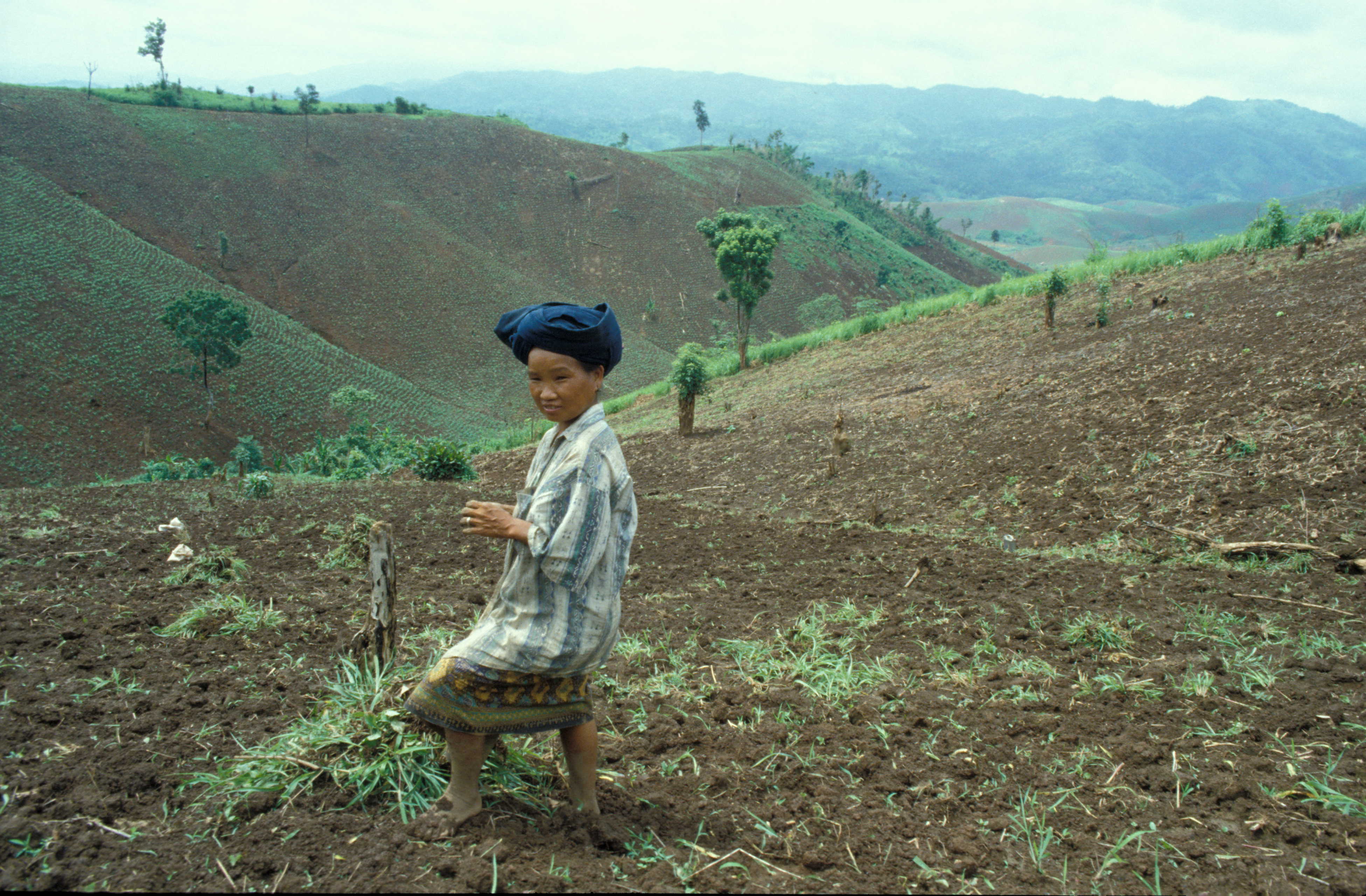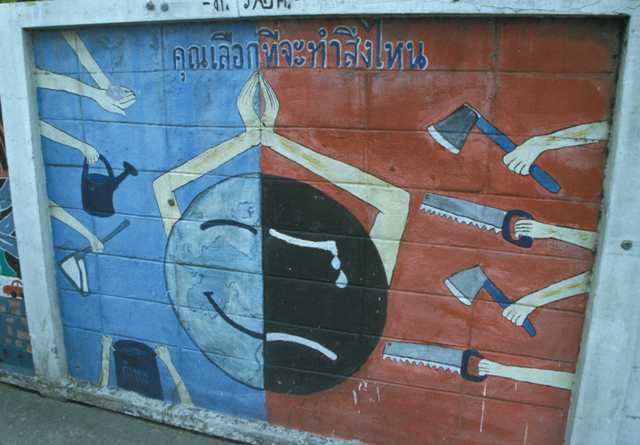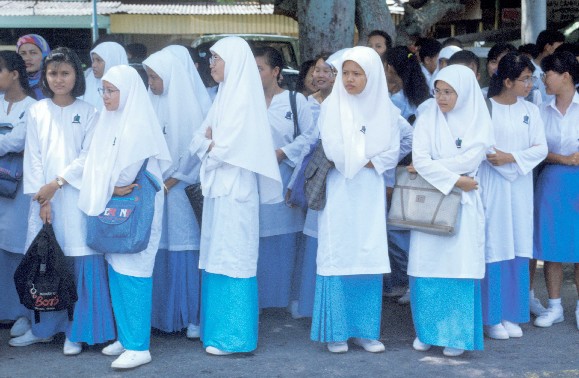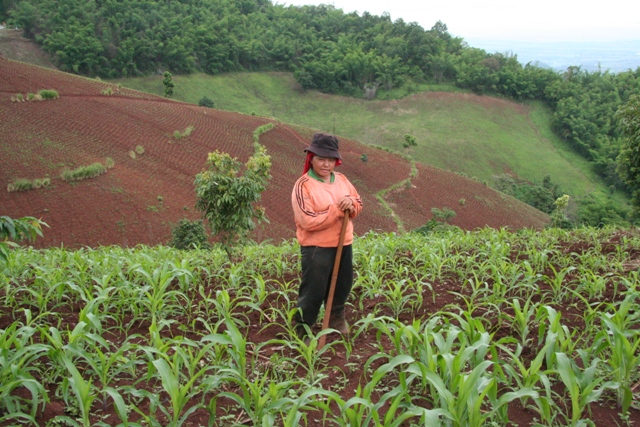
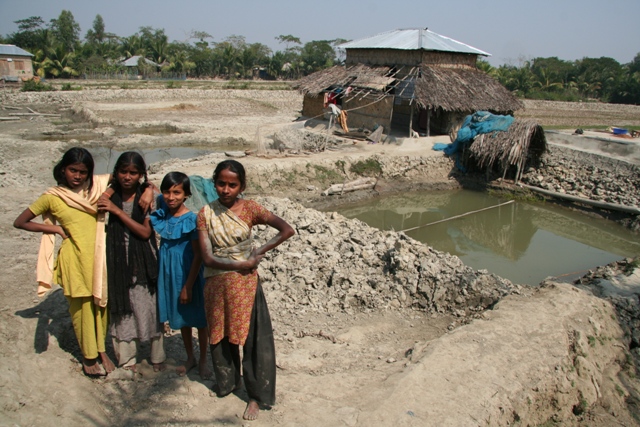
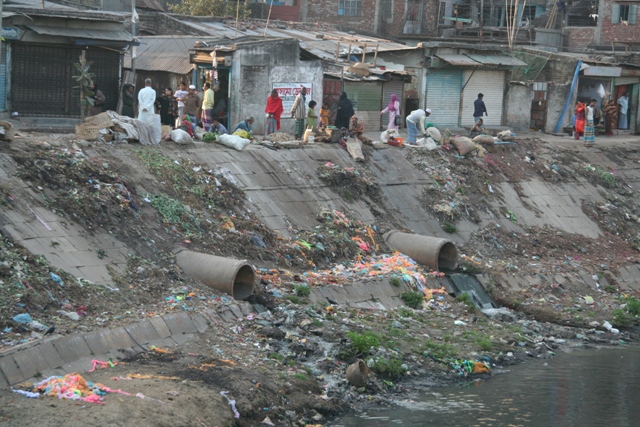
Environmental Research at ID: The Department of International Development, LSE
Environmental research in DESTIN uses social and political analysis to inform environmental policy formulation in developing countries. We are particularly interested in linking global concerns about climate, biodiversity and forests to local priorities at national and sub-national levels. The research is located within the Governance Research Stream in DESTIN and research is mainly overseen by Dr Tim Forsyth.
Some research themes include:
-Forests and livelihoods
-Climate change, poverty and adaptation
-Renewable energy adoption
-Civil society and policy processes
-Science, technology and democracy (part of the Science and Democracy Network)
-Political institutions and public-private collaboration



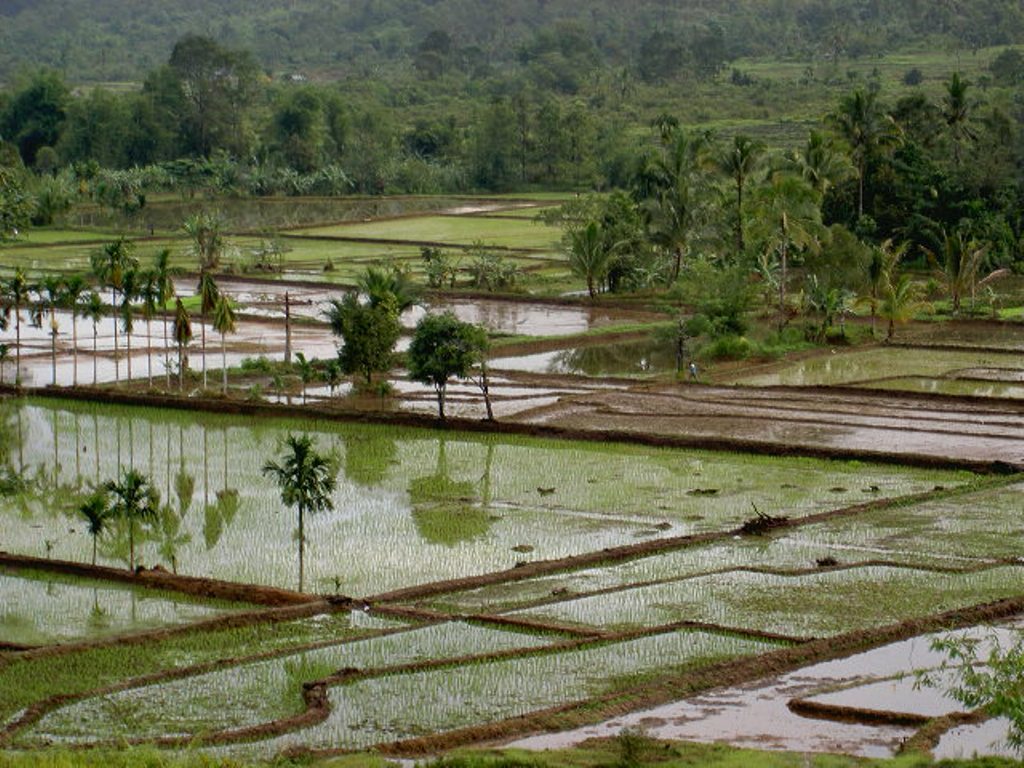
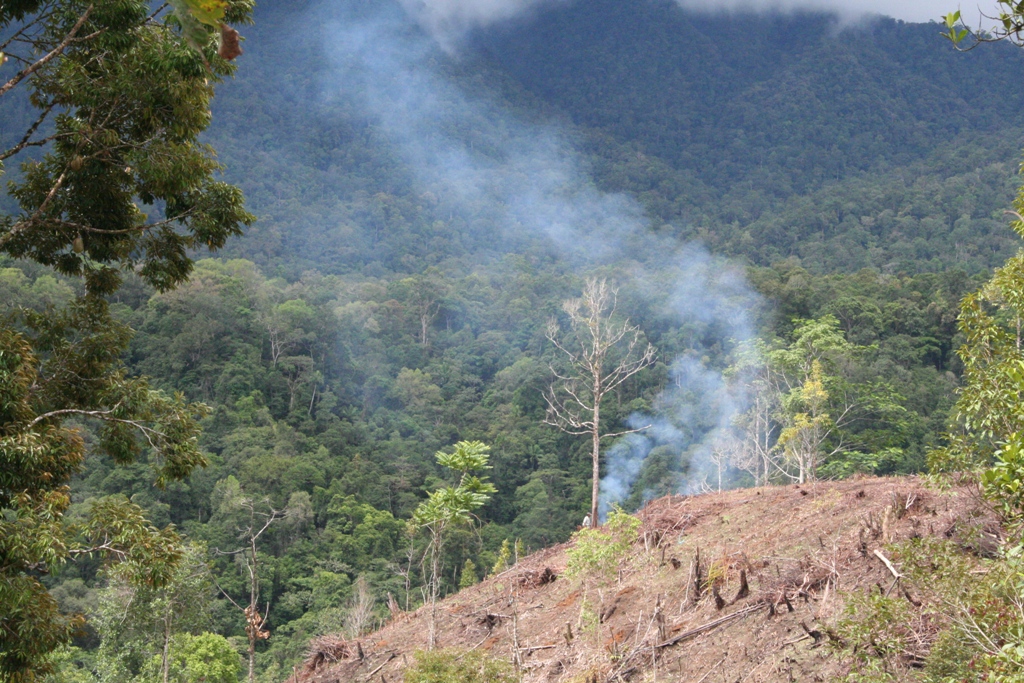
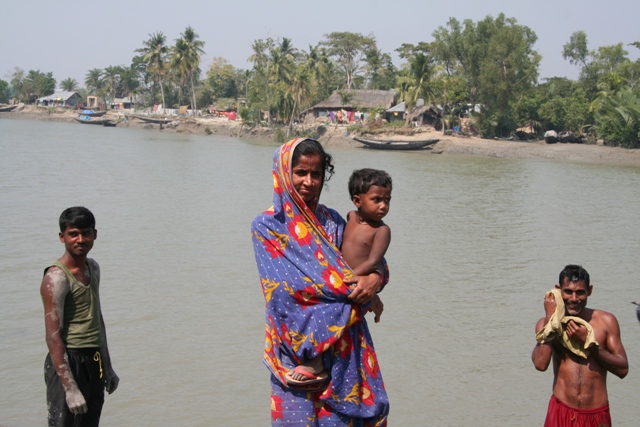
Current PhD students:
Jessica Ayers
Climate change policy and community-based adaptation in Bangladesh and Nepal.
"I work on the politics of adaptation to climate change, and especially the relationship between community-based approaches and climate change governance at national and international levels. I am interested in whether current climate change policy regimes can represent the diverse voices of the most vulnerable people. Bangladesh and Nepal are crucial examples of different poor countries threatened by climate change, and are test cases for merging adaptive practices and poverty alleviation."
Other work experience and collaboration: International Institute of Environment and Development (IIED), the World Bank, United Nations Development Programme, Winrock, United States Agency for International Development (USAID), Action Aid International, World Wide Fund for Nature (WWF), and the UK Department for International Development (DFID)
Publications:
Journal papers
Ayers J. (forthcoming) 2011. 'Resolving the Adaptation Paradox: Exploring the potential for deliberative adaptation policy making in Bangladesh. Global Environmental Politics
Ayers, J and Dodman, D. 2010. Climate change adaptation and development: The state of the debate. Progress in Development Studies. 10:2 161-168. Sage Publications.
Ayers, J., Huq, S., and Chandani, A. (in press) 'Assessing the Adequacy of EU Assistance for Adaptation to Climate Change in Developing Countries: a Southern Perspective.' Studia Diplomatica, Royal Institute for International Relations, Brussels.
Ayers, J. and Forsyth, T. 2009: 'Community Based Adaptation to Climate Change: Strengthening Resilience through Development' Environment 51: 4 22-31. Heldref Publications.
Ayers, J. 2009. Financing Urban Adaptation. Environment and Urbanization 21(1). Sage Publications
Ayers, J and Huq, S. 2009. Supporting adaptation through development: What role for ODA? Development Policy Review 27(6). Blackwell Publishing.
Ayers, J and Huq, S. 2008. The value of linking mitigation and adaptation: A case study of Bangladesh. Environmental Management. Springer, New York. Published online: 28 October 2008 doi:10.1007/s00267-008-9223-2
Book chapters
Ayers, J, Alam, M., and Huq, S. Adaptation in a Post-2012 Regime: Means to Integrate and Strengthen Policies and Programmes for Equity-based Climate Change Cooperation. In Biermann,F., Pattberg,P., and Zelli, F (eds) 2009. Global Climate Governance Post 2012: Architecture, Agency and Adaptation. Cambridge University Press. (In press)
Huq, S., and Ayers, J. Linking Adaptation and Disaster Risk Reduction. In Climate Change and Global Poverty: A Billion Lives in the Balance. Brookings Institution Press.
Huq, S., and Ayers, J. Challenges in Climate Change Adaptation. In R K Pachauri (ed) 2009. Climate Change. The Indian Institute of Technology (TERI). Delhi. (Forthcoming)
Ayers, J. 2009. Financing Urban Adaptation. In Bicknell, J., Dodman, D., and Satterthwaite, D., (2009). Adapting Cities to Climate Change. Earthscan, London.
Dodman, D., Ayers, J., and Huq, S. 2009. Building Resilience. In Worldwatch Institute, 2009. State of the World 2009: Into a Warming World. Worldwatch Institute, Washington DC.
Huq, S. and Ayers, J. 2008. Streamlining Adaptation to Climate Change into Development Projects at the National and Local Level. In European Parliament (2008) Financing climate change policies in developing countries. European Parliament, Brussels.
Other articles
Ayers, J. and S. Huq. 2009. Leading the Way. Himal Southasian. The Southasia Trust, Kathmandu.
Ayers, J., Alam, M., and Huq, S. 2009. Adaptation in Bangladesh. Tiempo 72.
Ayers, J. 2008. Implementing NAPAs. Tiempo 69, IIED, London.
Ayers, J., and Huq, S. 2008. Adaptation Funds and Development Assistance: Some frequently asked questions. Briefing Paper, IIED, London.
Huq, S., and Ayers, J. 2008. Taking steps: Mainstreaming National Adaptation. Briefing Paper, IIED.
Huq, S., and Ayers, J. 2007. Critical List: the 100 nations most vulnerable to climate change. Sustainable Development Opinion, IIED, London.
Ayers, J., Grieg-Gran, M., Harris, E., and Huq, S. 2006. Expanding the development benefits from carbon offsets. Sustainable Development Opinion. IIED, London.
Completed PhD January 2011.. Now working for International Institute for Environment and Development
Laureen Elgert
Environmental policy and the politics of sustainability in Paraguay
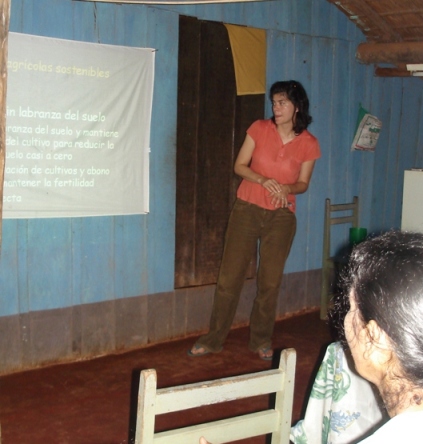
"I am particularly interested in ideas surrounding new spheres of 'democratization' and citizen participation in analyzing public policy. The current reliance on technical and scientific expertise in environmental policy often works against full public participation in decision-making. I am exploring alternative policy frameworks to increase the ways that specialist and popular perspectives can be used side by side. This research can help redefine what we mean by 'local' and 'global' perspectives; 'expert' and 'lay' knowledge; and 'political' and 'evidence-based' information. I am working in Paraguay, where there are serious conflicts over land, and different opinions about what environmental policy should achieve."
Other work experience and collaboration: Alberta Research Council (Canada), Fundacion Moises Bertoni (Paraguay), and Universidad Torcuato di Tella (Argentina)
Monica Di Gregorio
Decentralization, democracy, and institutional change in forest management in Indonesia
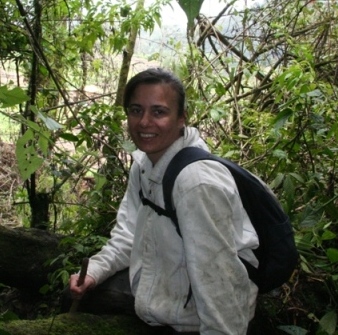
"My research investigates
the implications of democratization and decentralization processes for forest
management in Indonesia. Firstly I am assessing how political forces and civil
society have shaped decentralized forest policies.
Secondly, I am looking at the effects of these
changes on livelihoods of forest dependent communities by changing property
rights. I am conducting research particularly in Western Sumatra and Eastern
Kalimantan."
Other work experience and collaboration: Centre for International Forestry Research (CIFOR), International Food Policy Research Institute (IFPRI).
Arabella Fraser
Institutions, risk and vulnerability in urban Latin America
.jpg)
"Despite the widespread debate about climate change, there is still little known about how urban responses to climate change, and how climate will impact on existing responses to risk and vulnerability. My work considers potential threats from climate change in Colombia, and how we can revise models of adaptation, risk and livelihoods in urban, dynamic settings."
Publications:
Fraser, A. (2009): 'Harnessing Agriculture for Development', Oxfam International Research Report.
Fraser, A. with F. Mousseau (2008): 'How World Leaders should Respond to the World Food Price Crisis', Oxfam International Briefing Note (June 2008).
Fraser, A. (2008): ‘Review of ‘The World Food Economy’, Local Economy 13 (1).
Fraser, A. with M. Meijer (2007): 'What Agenda Now for Agriculture? A response to the WDR 2008', Oxfam International Briefing Note (Oct 2007).
Fraser, A. and D. Green (2005): ‘Financing the Millennium Development Goals and Beyond’, Paper for Glasgow pre-Gleneagles Conference (June 2005).
Fraser, A. with B. Emmett (2005): Paying the Price: the Case for Aid and Debt Relief (Oxford: Oxfam International, 2005).
Fraser, A. (2005): 'Approaches to Reducing Maternal Mortality: Oxfam and the MDGs' (2005), Gender and Development 13 (1).
Fraser, A. with M. Kamal-Smith and K. Watkins (2004): ‘The Cost of Childbirth’ (Reducing Maternal Mortality), Oxfam Briefing Paper (March 2004).
Fraser, A. and G. Fanjul (2003) ‘Dumping Without Borders’ (US Corn Dumping in Mexico), Oxfam Briefing Paper (August 2003).
Fraser, A. and J. Chanaa (2003) ‘A Fresh Start for Iraq: the Case for Debt Relief’, Oxfam Briefing Paper (May 2003).
Background papers (on request):
‘Reaping the Gains of the Agricultural Export Boom for Small Producers and Wage Labourers in Peru’, Research Paper for Intermon Oxfam, Lima, Peru, Dec 2006 ‘Managing Rwanda’s Aid Dependence’, with L. Whitfield and Alistair Fraser, Paper for Centre for Global Economic Governance Workshop, University of Oxford, Sep 2006.
Alexandra Mallett
Renewable energy technologies, trade policy, and technology cooperation in urban Latin America
Completed PhD 2009: Now an Assistant Professor at the School of Public Policy & Administration, Carleton University, Canada.
See here for the MSc in Sustainable Energy Engineering and Policy.

"Many studies on renewable energy in the developing world are based on evidence from rural environments or from information at the national level. Yet, more than half of the world now is urban. We need new models to explain the adoption of renewable energy, which refer to cities, and to the impact of national and international trade policies on the adoption of technology. My research looks at solar urban heating in Mexico and Brazil, and in particular at how we need to rethink ways of understanding technology transfer and technology cooperation. My main question is: to what extent do trade policies explain renewable energy adoption in the urban developing world? "
Other work experience and collaboration: University of Minnesota, Government of Canada (Natural Resources Canada, Environment Canada), and United Nations Environment Programme / Regional Office for Latin America and the Caribbean (UNEP / ROLAC), Science Policy Research Unit (SPRU) University of Sussex.
Publications:
Journal Articles
(In Review) Mallett, Alexandra, David Ockwell, Ruediger Haum and Jim Watson, “Intellectual Property Rights and Low Carbon Energy Technology Transfer: Conflicting Discourses of Diffusion and Development”, Global Environmental Change.
Mallett, Alexandra, “Social acceptance of renewable energy innovations: The role of technology cooperation in urban Mexico”, Energy Policy, May 2007
Government Reports
UK-India Collaborative Study on the Barriers to the Transfer of Low Carbon Energy Technology: Phase II
Mallett, Alexandra, David Ockwell, Prosanto Pal, Amit Kumar, Dr. Y Abbi, Jim Watson, Ruediger Haum, Gordon MacKerron, Girish Sethi (in press)
Energy Savings Report – State of Minnesota
Mallett, Alexandra, Dane McFarlane, Steve Kelley, A report on barriers, costs, benefits and policy options on energy savings strategies for public buildings in the State of Minnesota, February 2008
Bimbika Sijapati
Forests, gender and decentralized policy in Nepal
Completed PhD 2008
"Many countries are now adopting decentralized forest policies and 'community forestry.' The role of gender, however, is still unclear. My research in the middle hills of Nepal examines how and why gender relations in specific historical contexts matter for the governance of community forestry. My research also examines how non-local actors such as the state and development organizations can intervene successfully and achieve forest conservation and equitable development at the same time."
